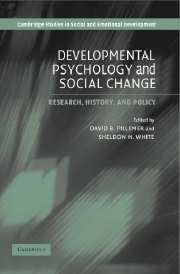Book contents
- Frontmatter
- Contents
- Preface
- List of Contributors
- Introduction: What Kind of Science Is Developmental Psychology?
- Part One The Developing Child: Global and Historical Perspectives
- Part Two Designing Child and Family Policies
- Part Three Designing Child Health Policies
- Part Four Designing Effective Learning Environments for Children and Adolescents
- 9 A Cultural/Historical View of Schooling in Human Development
- 10 The Rise of the American Nursery School: Laboratory for a Science of Child Development
- 11 Actualizing Potentials: Learning through Psychology's Recurrent Crises
- 12 The Rise of a Right-Wing Culture among German Youth: The Effects of Social Transformation, Identity Construction, and Context
- 13 Learning Potential Assessment: Where Is the Paradigm Shift?
- 14 Teaching as a Natural Cognitive Ability: Implications for Classroom Practice and Teacher Education
- Index
- References
13 - Learning Potential Assessment: Where Is the Paradigm Shift?
Published online by Cambridge University Press: 03 December 2009
- Frontmatter
- Contents
- Preface
- List of Contributors
- Introduction: What Kind of Science Is Developmental Psychology?
- Part One The Developing Child: Global and Historical Perspectives
- Part Two Designing Child and Family Policies
- Part Three Designing Child Health Policies
- Part Four Designing Effective Learning Environments for Children and Adolescents
- 9 A Cultural/Historical View of Schooling in Human Development
- 10 The Rise of the American Nursery School: Laboratory for a Science of Child Development
- 11 Actualizing Potentials: Learning through Psychology's Recurrent Crises
- 12 The Rise of a Right-Wing Culture among German Youth: The Effects of Social Transformation, Identity Construction, and Context
- 13 Learning Potential Assessment: Where Is the Paradigm Shift?
- 14 Teaching as a Natural Cognitive Ability: Implications for Classroom Practice and Teacher Education
- Index
- References
Summary
Learning potential assessment (LPA) is only slightly younger than intelligence testing itself. In the early 1930s Lev Vygotsky (1934/1986) in Russia and Andre Rey (1934) in Switzerland made clear statements in favor of LPA procedures. As shown in recent reviews (Lidz, 1987; Weidl, Guthke, and Wigenfeld, 1995) even the period between the 1940s and the 1960s that appeared to be totally dominated by the psychometric approach had its share of LPA attempts. Finally in the 1960s, on the wave of widespread dissatisfaction with the existent psychometric intelligence tests, LPA approaches became operationalized (Budoff and Friedman, 1964; Feuerstein and Shalom, 1968) and started forming a field of their own (Campbell and Carlson, 1995; Kozulin and Falik, 1995). Yet at the beginning of the 21st century, 70 years since its theoretical inception and 30 years since its operationalization, LPA still remains a rather marginal form of assessment as compared to the dominant psychometric IQ approach. In terms of Kuhn's (1970) theory of scientific revolutions, the paradigm shift failed to take place. In this chapter, I will attempt to answer the question of why to the present time the LPA paradigm has not succeeded in dislodging the psychometric paradigm.
The Concept of LPA
Since its inception in the work of Binet and Simon, the concept of intelligence testing was closely connected to the task of evaluating the learning abilities of children and adults.
- Type
- Chapter
- Information
- Developmental Psychology and Social ChangeResearch, History and Policy, pp. 352 - 367Publisher: Cambridge University PressPrint publication year: 2005
References
- 5
- Cited by

